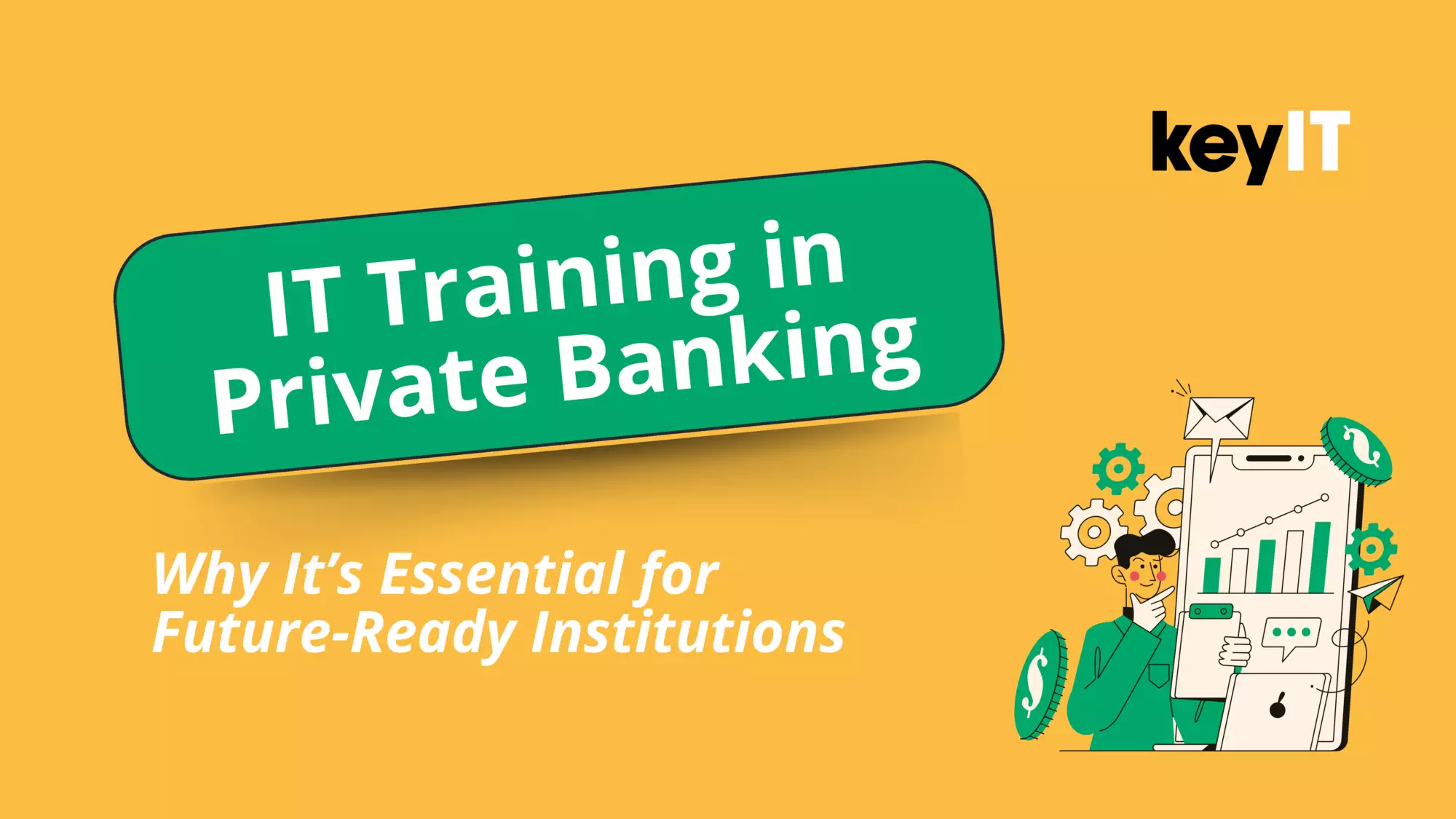IT Training in Private Banking: Why It’s Essential for Future-Ready Institutions

With the rise of cloud computing, AI, and cybersecurity threats, private banking is undergoing rapid digital changes. However, the industry faces a major challenge: a significant skills gap among IT professionals. According to industry experts, traditional IT training methods are no longer sufficient. A structured, continuous learning approach is essential for ensuring compliance, security, and operational efficiency in private banking.
This article explores why IT training is critical, the key skills needed today, and how financial institutions can measure the ROI of training programs to prepare their workforce.
The IT Skills Gap in Private Banking
"Most IT teams in private banking are still operating on legacy systems, making them highly vulnerable to modern threats." – Ben Musso, CTO at REYL Intesa Sanpaolo.Private banks have historically relied on legacy systems, but the rapid adoption of cloud computing, AI, and cybersecurity frameworks has created a demand for new technical expertise. Without structured IT training, banks risk falling behind in innovation, security, and regulatory compliance.
The Most In-Demand IT Skills for Private Banking
To stay competitive, private banks must prioritize continuous training in the following key areas:
✔ Cybersecurity & Risk Management – Protecting financial data from phishing, ransomware, and insider threats.
✔ Cloud & DevOps – Implementing secure cloud architectures, CI/CD pipelines, and cloud governance.
✔ AI & Data Science – Leveraging AI-driven insights, machine learning models, and large language models (LLMs).
✔ Regulatory Compliance – Ensuring adherence to DORA, FINMA, and GDPR or Federal Data Protection Act in Switzerland.
✔ Identity & Access Management (IAM) – Strengthening security through Privileged Access Management (PAM) and Zero Trust frameworks.
"Most cyber incidents originate from human error—this is why IT training is not just an option but a necessity." – René Bénard, Senior Cloud Architect and Microsoft Trainer at keyIT.By equipping IT teams with these critical skills, banks can improve cyber resilience, operational efficiency, and regulatory compliance.
Challenges in IT Training for Private Banks
"The average salary of a hacker conducting attacks is approximately $30,000 per month." – Paula Januszkiewicz, renowned Cybersecurity Expert and Founder of CQUREDespite the growing importance of IT training, many financial institutions struggle with:
❌ Training methods that don’t evolve with technology
❌ Training methods that don’t evolve with technology
❌ Budget constraints limiting investment in upskilling programs
❌ Resistance to change among employees used to legacy systems
❌ Lack of structured learning paths designed for private banking
To address these challenges, private banks need a scalable, structured training model that blends e-learning, in-person training, and certification programs.
Measuring the ROI of IT Training in Private Banking
Employees who receive cybersecurity awareness training reduce phishing incidents by up to 80%.
Given the significant investment required for IT training, banks must track ROI metrics to justify expenses and plan future training initiatives:
✔ Reduction in cybersecurity incidents (e.g., fewer phishing attacks)
✔ Faster deployment of cloud and AI solutions
✔ Increased operational efficiency and reduced system downtime
✔ Employee retention and upskilling progress
By tracking these metrics, banks can ensure that their IT training programs deliver measurable business value.
The Future of IT Training: Excellence Academy & Continuous Learning
"AI-supported attacks and deepfakes are already being used in real cyber heists, including a $20 million attack on a Hong Kong-based financial company." – Paula JanuszkiewiczTo address the skills gap effectively, banks should adopt a continuous learning strategy. One emerging trend is the creation of Excellence Academy, which bring together:
✔ Industry Experts & Trainers – Ensuring high-quality instruction designed for private banking.
✔ Collaborative Learning – Shared training programs among financial institutions to reduce costs and improve industry knowledge.
✔ Flexible Training Models – Combining self-paced e-learning, live expert-led sessions, and hands-on labs.
✔ Collaborative Learning – Shared training programs among financial institutions to reduce costs and improve industry knowledge.
✔ Flexible Training Models – Combining self-paced e-learning, live expert-led sessions, and hands-on labs.
"Traditional IT training in banks was about selecting a course and attending a class. Today, it must be a continuous learning strategy, blending e-learning, on-demand content, and live expert-led training." – Ben MussoBanks that implement this approach not only strengthen security and compliance but also prepare their teams for future technology shifts.
Final Thoughts & Next Steps
IT training is no longer a “nice-to-have” - it’s a business-critical requirement for private banks addressing cybersecurity risks, cloud adoption, and regulatory challenges.
To stay ahead, financial institutions must:
✔ Invest in continuous learning programs tailored to banking IT needs.
✔ Develop a structured training roadmap covering cybersecurity, AI, and cloud computing.
✔ Measure training ROI to track improvements in security, compliance, and efficiency.
🎥 Watch the full discussion here.
✔ Develop a structured training roadmap covering cybersecurity, AI, and cloud computing.
✔ Measure training ROI to track improvements in security, compliance, and efficiency.
🎥 Watch the full discussion here.
Want to take the next step? Discover how IT Excellence Academies can transform IT training in private banking.



